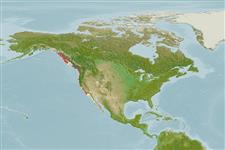Environment: milieu / climate zone / depth range / distribution range
Ökologie
seewasser demersal; tiefenbereich 8 - 12 m (Ref. 51666). Subtropical; 59°N - 27°N, 156°W - 114°W
Eastern Pacific: Kodiak Island, Alaska to Rio Santo Tomas, northern Baja California, Mexico.
Size / Gewicht / Alter
Maturity: Lm ? range ? - ? cm
Max length : 30.5 cm TL Männchen/unbestimmt; (Ref. 4925)
Rückenflossenstacheln (insgesamt) : 65 - 73; Rückenflossenweichstrahlen (insgesamt) : 0; Afterflossenstacheln: 0; Afterflossenweichstrahlen: 40 - 52. Caudal rounded; pectorals as minute flaps (Ref. 6885). Dark reddish brown to black with head pale enough to display 3 dark light-edged bands radiating from each eye; light band sometimes prominent across base of caudal fin and extending on dorsal and anal fins (Ref. 6885).
Facultative air-breathing (Ref. 126274); Juveniles and adults inhabit intertidal areas down to 8 m depth (Ref. 2850); Individuals to 2 cm in length have been taken from surface waters (Ref. 6885). Found under rocks and in gravel areas (Ref. 2850). May remain out of water under rocks or seaweed (Ref. 31184). Breathe air (Ref. 31184) and can stay out of water for 10-23 hours if kept moist (Ref. 51276). Oviparous, eggs are laid in several clumps or masses which are guarded by the male (Ref. 58332).
Eggs are laid in several clumps or masses which are guarded by the male (Ref. 58332).
Eschmeyer, W.N., E.S. Herald and H. Hammann, 1983. A field guide to Pacific coast fishes of North America. Boston (MA, USA): Houghton Mifflin Company. xii+336 p. (Ref. 2850)
IUCN Rote Liste Status (Ref. 130435: Version 2024-2)
Bedrohung für Menschen
Harmless
Nutzung durch Menschen
Tools
Zusatzinformationen
Download XML
Internet Quellen
Estimates based on models
Preferred temperature (Ref.
123201): 8.9 - 14, mean 10.1 °C (based on 169 cells).
Phylogenetic diversity index (Ref.
82804): PD
50 = 0.7500 [Uniqueness, from 0.5 = low to 2.0 = high].
Bayesian length-weight: a=0.00389 (0.00180 - 0.00842), b=3.12 (2.94 - 3.30), in cm total length, based on all LWR estimates for this body shape (Ref.
93245).
Trophic level (Ref.
69278): 2.5 ±0.2 se; based on diet studies.
Widerstandsfähigkeit (Ref.
120179): mittel, Verdopplung der Population dauert 1,4 - 4,4 Jahre. (tm=2.5; Fec=1,700).
Fishing Vulnerability (Ref.
59153): Low vulnerability (21 of 100).
